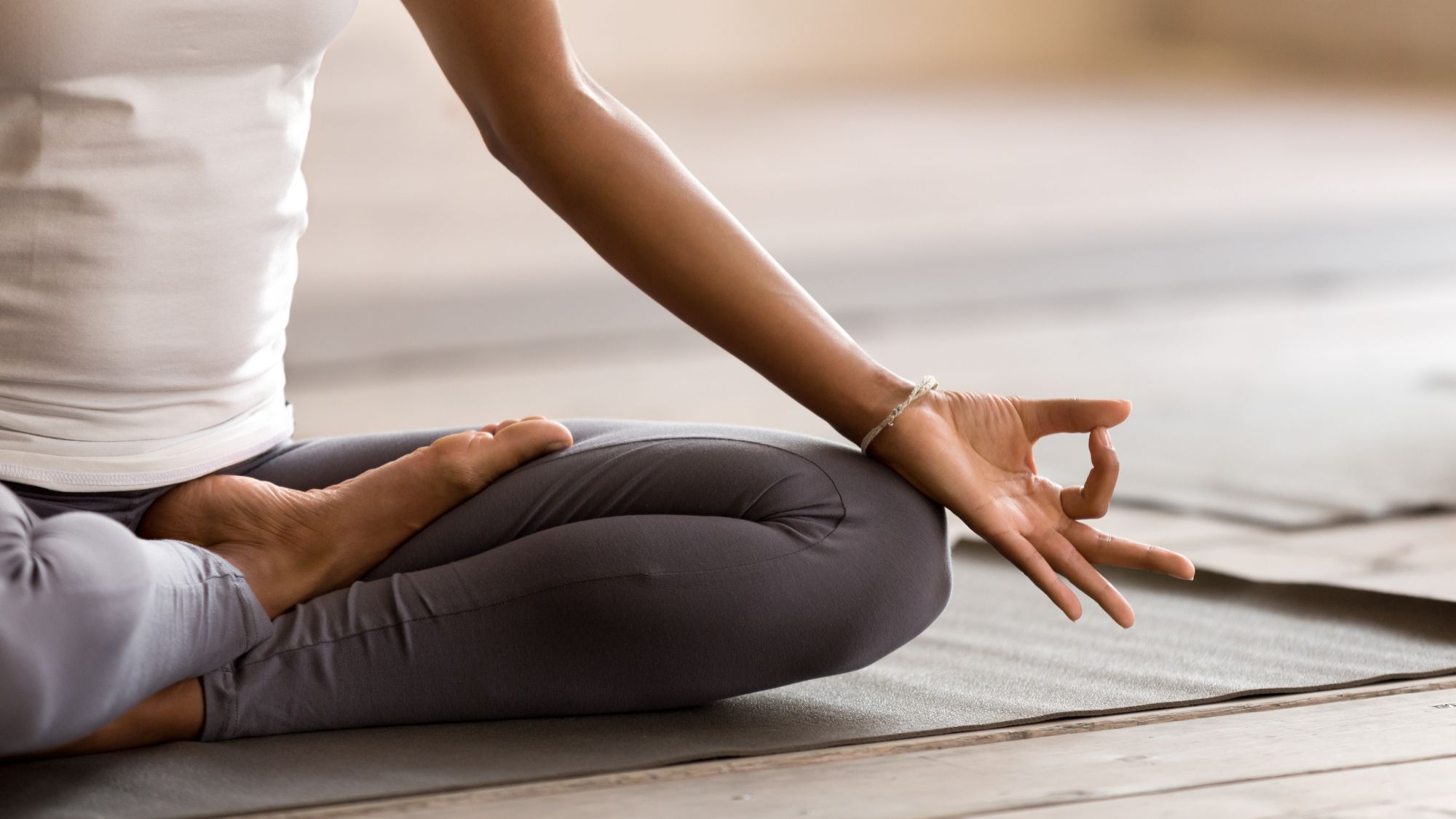Feel like you're reaching breaking point? These are the 10 simplest ways to avoid burnout

If you're searching the Internet for how to avoid burnout, you're not alone. Search around the subject has rapidly spiked this month, which indicates that more people than ever are feeling like they're at breaking point.
It's no surprise, given the current cost of living crisis and global climate. That said, it's important to know when your stress becomes something to worry about. We all know the signs of stress but it's all too easy to shrug them off as part of your day-to-day. Everyone gets stressed, right?
Right - but burnout is a whole different kettle of fish. According to Mental Health UK, burnout actually describes both physically and mentally exhaustion. "It can occur when you experience long-term stress in your job, or when you have worked in a physically or emotionally draining role for a long time," their website shares.
Not sure how burnout symptoms present themselves? Common signs you might be struggling with burnout include feeling constantly tired or drained, detached, depressed, or overwhelmed.
Sound familiar? Know this - you're not alone, and it can happen to the best of us. That said, there are steadfast ways to prevent burnout from happening altogether - which is why we've picked the brains of resilience coach and author Jo Owen, who's an expert in mental health and forming healthy habits.
Don't miss our guides on how to manage stress and the best stress apps to download, while you're here.
How to avoid burnout: your guide
1. Be kind to yourself
"Our internal chatter often reflects our worst critics," she shares.
Marie Claire Newsletter
Celebrity news, beauty, fashion advice, and fascinating features, delivered straight to your inbox!
Try this: instead, Owen recommends trying to tame the chatter and reframe your negative thoughts. "Stop beating yourself up and trying to be perfect," she advises. "Instead, focus on what you are good at and what you have achieved."
Our guides to self care ideas and simple daily acts of kindness might help, too.
2. Get support
Remember - you're not alone, and asking for help is never a bad thing. "Don’t carry the burdens of the world, your family or your team on your shoulders," recommends Owen.
Try this: seek help and advice where you can. After all, a problem shared is a problem halved. Solutions to the hardest problems can often be found over a cup of tea with someone you trust.
3. Take control
Did you know? There's a big difference between feeling pressured and feeling stressed, with studies showing that while people perform well under pressure, they often crack under stress.
Try this: "focus your efforts on what you can do, not on what you can’t do," recommends Owen. "Even small steps boost confidence and can help to make a big difference."
Investing in a wellness planner is one of the easiest ways to organise your week and keep stress levels at bay.

4. Find purpose in what you do
This one's important, especially if you're feeling like you might be in the wrong job or career path. Ask yourself this: do you find purpose in your every day? And do you take active steps to make sure you're enjoying your life and what you do?
If the answer to either of those questions was no, it might be worth assessing why that is.
"People who survive and thrive in life are the ones who find meaning and purpose in what they do," Owen explains. "Focus on how your day-to-day is helping you to build a better future for yourself, your family and for others," she advises.
5. Take breaks
Whether you're in the office or working from home, making sure you take screen breaks and spend time away from your desk is key for avoiding burnout.
Why? Because while the temptation to power through and tick more off your to do list might be strong, several studies - including this 2016 study published in the Scandinavian Journal of Work and Organizational Psychology - found taking lunchtime breaks and detaching from work, increases levels of energy at work and decreases exhaustion, not to mention energy levels over time.
"While statistics show that we work fewer hours than previous generations, I don't think they're accurate," the resilience coach shares. "Formal working hours may be shorter, but when we leave the office, the office does not leave us. We are expected to be on 24/7 and that is unsustainable."
Her advice? "Set boundaries, be clear about when it is reasonable to expect responses to emails and calls out of hours, and when on holiday, be on holiday. The office will not collapse if you fail to check in."

6. Mind your language
Ever heard of catastrophising? If not, let us explain. Catastrophising describes getting stuck in a mindset that makes you assume the worst will happen (think falling flat on your face at a social event or making an error at work).
If you're looking to avoid burnout, it's important to be mindful of your internal dialogue, as we've pointed about above, being especially careful not to catasatrophise when you find yourself in situations that are highly stressful.
One sure sign that you're experiencing burnout is finding plenty of evidence to confirm your catastrophising - for example,
"Stop yourself and see if you can find any evidence that your worry might be unwarranted. For example, while Google might be telling you your headache is something more serious, the only way to find out for certain is to see a medical professional - so try and keep your worries in check until then," Owen shares.
7. Stay focused
The next step in avoiding burnout? Try and focus on - well, your focus.
Think about it: the more you get done at work, the less stressed you'll feel to be productive and meet targets.
That said, it's important to know that your productivity does not define your self worth. (Often, people find themselves in a toxic catch twenty two whereby they become stressed about being focused, rather than just focusing enough to crack on with work). Not sure where to start? Things like making sure you're in a tidy workspace, taking necessary breaks, and putting time limits on your social media apps can all be helpful.
Try this: "Set clear goals for the next hour to help yourself focus," recommends Owen. "Avoid interruptions and distractions and then reward yourself with a break. Work, rest, repeat."

8. Look after yourself
And this will look different to everyone, as every body is different. Some will prefer yoga poses, others running - some will feel better fuelled by carbs, other a higher protein diet.
Know this, though: you don't need to have completed a half marathon before breakfast to be healthy. Trust me - I'm a Health Editor so I've tried the lot. My guides to wellness tips, energy boosting foods, and bodyweight exercises might help, as might our top tips for how to stay healthy on a budget.
Why is eating well and moving regularly key for avoiding burnout? Well, think about it: when you feel good, your stress levels will likely be lower, too.
Small things, like getting off the tube one stop early and walking or adding in one or two vegetables to your lunch, all add up.
9. Prioritise your sleep
According to the National Institute of Health, "good sleep improves your brain performance, mood, and health."
So, getting enough sleep is key for feeling your best self and, in turn, preventing burnout.
"Being tired has the same effect on cognitive abilities as being drunk," shares Owen. "Case in point: studies have found that athletes routinely perform better with more sleep."
10. Practice gratitude
Sounds simple, but practicing gratitude often isn't when you've got 101 things to do, kids screaming, and a fast diminishing patience.
That said, reminding yourself to focus on the positive not the negatives is a powerful way of lowering stress levels. Try out some breathwork training at the same time, and you're almost guaranteed to avoid burnout. Win, win.
Try this: write down three good things that happened in the day in a notebook before you go to bed. As our guide to journaling for anxiety shows, it's a great way to air your concerns and stop yourself from catastrophising.

Ally Head is Marie Claire UK's Senior Health and Sustainability Editor, nine-time marathoner, and Boston Qualifying runner. Day-to-day, she heads up all strategy for her pillars, working across commissioning, features, and e-commerce, reporting on the latest health updates, writing the must-read wellness content, and rounding up the genuinely sustainable and squat-proof gym leggings worth *adding to basket*. She also spearheads the brand's annual Women in Sport covers, interviewing and shooting the likes of Mary Earps, Millie Bright, Daryll Neita, and Lavaia Nielsen. She's won a BSME for her sustainability work, regularly hosts panels and presents for events like the Sustainability Awards, and is a stickler for a strong stat, too, seeing over nine million total impressions on the January 2023 Wellness Issue she oversaw. Follow Ally on Instagram for more or get in touch.
-
 Penn Badgley and Blake Lively kept their breakup a secret from the Gossip Girl cast and crew - here's what we know about their former relationship
Penn Badgley and Blake Lively kept their breakup a secret from the Gossip Girl cast and crew - here's what we know about their former relationshipBy Jenny Proudfoot
-
 Spring has finally sprung - 6 best outdoor workouts that are totally free and boost both body and mind
Spring has finally sprung - 6 best outdoor workouts that are totally free and boost both body and mindSoak in the nature and boost Vitamin D *and* endorphins.
By Anna Bartter
-
 This iconic rose perfume is a compliment magnet—it makes me feel ‘put together’ after just one spritz
This iconic rose perfume is a compliment magnet—it makes me feel ‘put together’ after just one spritzGrown-up and elegant, yet not at all dated.
By Denise Primbet